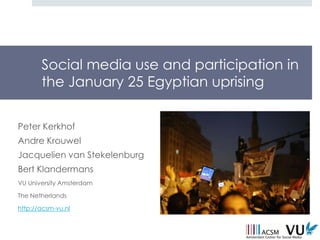
Social media use and the #25jan Egyptian uprising (ECREA 2012, Istanbul)
- 1. Social media use and participation in the January 25 Egyptian uprising Peter Kerkhof Andre Krouwel Jacquelien van Stekelenburg Bert Klandermans VU University Amsterdam The Netherlands http://acsm-vu.nl
- 5. Social media & protest Four functions of social media (Norris, 2011) 1. informational (spreading knowledge, awareness, and news) 2. networking (coordinating collective actions and organizing movements) 3. cultural (strengthening democratic aspirations and critical evaluations of regime performance) 4. behavioral (reinforcing the propensity for citizens to engage in protest acts challenging the regime) Did social media play this role in the Egyptian uprising?
- 6. Survey evidence so far Norris (2011) 2007 data: Political activism in Egypt related to media use (and especially) internet use 2010 data: social media considered helpful for becoming involved in politics for 25-33% of population in 2010 Egyptian social media users were….. more hopeful about the future of Egypt more positive about the economy as (un)democratic as non-users of social media
- 7. Survey evidence so far Tahrir data set (Wilson & Dunn, 2011; Tufekci and Wilson, 2012) Interviews with 1200 protesters at Tahrir square End of February 2011 (2 weeks after Mubarak resignation) High internet use, high use of social media Social media information most important motivator for participation 1st day participation related to social media use
- 8. Survey evidence so far No comparison groups Do protesters rely more on social media for political information than (otherwise equal) non-protesters? No underlying processes How are social media use and attitudes (e.g. democratic attitudes) related to protest participation? Our study: Relate social media use to protest participation Study of underlying processes
- 9. Our study
- 10. Our study Vote Compass Egypt Egyptian parliamentary elections Data collection nov-dec 2011 80.000 respondents 1152 Egyptians (and living in Egypt), answered all additional questions 46% participated in street protests, 16% participated on January 25th Av. 34 years old, 79% male Highly educated: 86% university degree (Wilson & Dunn, 2011: 77%) 98.4% Arab language 57% Cairo, 14% Alexandria, 5% Giza
- 11. Measures Political information sources: How important are the following sources for you to get information about politics ? television, radio, internet news sites, newspapers, word-of mouth from family /friends, prayers & meetings at mosque /church, place of work, organized meetings, SMS, pamphlets and signs, and Facebook/Twitter Democratic attitudes There should be no restrictions on the right to demonstrate There should be absolute freedom to report on social and political issues The state should give up all its media ownership There should be some restrictions on the content of books and films
- 12. Measures Optimism about the future: How do you think the situation of the country will be in five years? (1=much better, 2=somewhat better, 3=somewhat worse, 4=much worse), reverse coded Trust in government: How much do you trust the following institutions: police, government, judiciary, and state run media (1=a lot, 2=a little, 3=not really, 4=not at all), reverse coded
- 13. Results
- 14. Results
- 15. Results Democratic attitudes .148 .406 (.031) (.068) .239 Use (.070) Participation Facebook in street /Twitter .346 protest .089 (.026) (.081) Optimism -.081 -.317 (.022) (.096) Trust in government
- 16. Results Democratic attitudes + + Use + Participation Facebook in street /Twitter protest + + Optimism - - Trust in government
- 17. Results Democratic attitudes + Use + Participation organized in street meetings protest + + Optimism - Trust in government
- 18. Results Democratic attitudes + Participation Use radio /TV in street protest + Optimism + - Trust in government
- 19. To conclude Social media use is related to protest participation Other media are related as well, but in other ways Mediation partly by democratic attitudes, distrust in government and optimism about Egypt’s future Limitations: Self selected sample Not entirely representative of protesters Not at all representative of Egyptian population Correlation ≠ causation (but it’s a start) TV: state-run or satellite?
